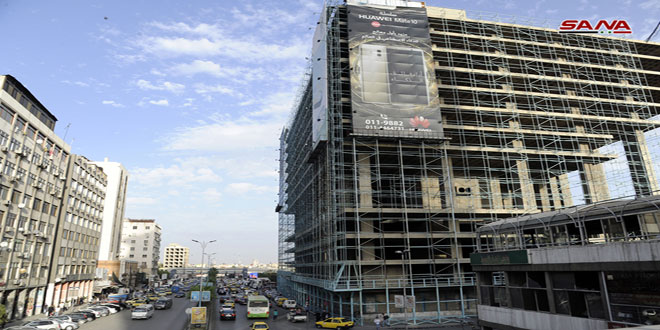



Social media accounts have circulated pictures showing the opening of a parking lot in the Yalbugha complex in central Damascus. The move is the first of its kind after the project has been put on hold for nearly 40 years.
Sahnaya, a Syrian news network, posted on Facebook on 19 November that a parking garage was opened in the Yalbugha complex to reduce traffic congestion in Marjeh area in central Damascus.
The Yalbaga complex, which has been stalled more than once in almost 40 years, has become a shorthand for neglect, and political, economic and administrative corruption under the successive Assad regimes.
According to the pro-government newspaper, Al-Thawra, the director of the Syrian Waqf (Islamic Endowments), Ahmad Qabbani, described the Yalbugha project as one of the largest projects implemented by the ministry. Qabbani added that the project makes a quantum leap in solving the problem of congestion in the center of the capital through parking lots that can accommodate more than 300 cars. The project will also include a commercial shopping mall. The mall will include offices and shops that showcase the urban development of Damascus, according to Qabbani.
Wasim al-Qattan wins Yalbugha project
Earlier this year, the Intercept Point Company, owned by Syrian businessman Wasim al-Qattan, signed an investment contract for the Yalbugha complex in a billion Syrian pound deal.
In January 2019, the website, Hashtag Syria, stated that the value of the contract reached 1.725 billion Syrian pounds (SYP – around 2,330,000 USD).
According to al-Iqtisadi, a local website focused on financial news, al-Qattan said that the project will be initiated once the handover process takes place in order to construct and equip the building. Al-Qattan highlighted that the complex will include hotels, restaurants, a mall, as well as an underground parking garage and a park.
Wasim al-Qattan rose to prominence suddenly in the economic sector at the end of 2018 after he invested in government facilities with millions of Syrian pounds and after being appointed the head of the Damascus Chamber of Commerce in February 2018.
Al-Qattan’s first appearance was when he invested 20 million pounds (approximately 27 million USD) in Qassioun Mall which is located in Masaken Barzeh in Damascus, to be one of the largest investments in Syria.
Beginning of Yalbugha project
Planning of the Yalbugha project date back to the mid-1960s, when the Ba’ath Party first came to power in Syria.The project remained a dead letter until the military housing foundation, started constructing the complex in early 1973. At that time, the foundation was the sole supervisor of all construction projects in Syria, headed by Riad Shalish, a relative of President Hafez al-Assad.
However, many obstacles and problems prevented the continuation of Yalbugha’s construction, including a shortage of building materials such as iron and cement in the 1980s, as well as the delimitation of the real estate boundary with the province of Damascus.
The biggest problem was the emergence of groundwater during drilling, as a result of the failure to prepare adequate surveys by experts and technicians, and not to take samples of soil and study it for such a large project which is located near the Barada River.
Mohamed Mazhar Sharbaji, an official at the Ministry of Local Administration of the opposition-affiliated Interim Government, told Enab Baladi earlier that the water removal process lasted for two years, in the absence of experts to benefit from the underground wells in the area and from the water that came out to feed the city of Damascus, especially with the decline and drought of the Barada River.
The construction of Yalbugha was put on hold again for an additional ten years. Then, the project was re-studied after the water was drained from the area. Thus, the military housing foundation began the construction of the complex in the beginning of 1990 to be completed in 2004. The project complex, later, became part of the properties of Ministry of Islamic Endowments which opened investments in the project in order to finalize it.
if you think the article contain wrong information or you have additional details Send Correction